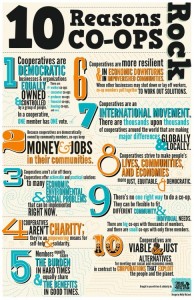Prout recognises that private sector economy has had an enormous appeal to industrious people, providing for significant industrial-economic output under capitalism. A typical idea is that the collective would hold back or drain efficient and creative dynamics, which are among the hallmarks of many successful entrepreneurs.…
Still, Prout's three-tiered economic system views the cooperative sector as the largest and central,
Category Archives: Cooperatives
The Limits of Business
A Prout Globe survey
As is well known, Prout places limits on the individual accumulation of physical wealth. It leaves it to the collective to decide on those limits. The private sector is distinctly regulated under Prout. We should note that such private sector limitations do not refer to psychic and spiritual types of wealth but to physical, material wealth …
Business People
By Shrii Prabhat Rainjan Sarkar
From "Various Occupations", Human Society Part 1 (1959). Also published in Prout in a Nutshell Volume 1 Part 3, in Supreme Expression Volume 2, and in The Great Universe: Discourses on Society.
Is the medical profession alone floundering in the quagmire of sin? No. Delve into the recesses of any business person's mind and …
Co-operatives; educational material
 The Toolbox for Education and Social Action web site offers great educational material for evolving cooperatives, democratic businesses, and social justice consciousness. Titles include the board game Co-opoly, educational material Own the Change, and the “fast-paced social justice trivia game” Loud & Proud.
The Toolbox for Education and Social Action web site offers great educational material for evolving cooperatives, democratic businesses, and social justice consciousness. Titles include the board game Co-opoly, educational material Own the Change, and the “fast-paced social justice trivia game” Loud & Proud.
On offer is also a 10 Reasons Co-ops Rock poster, shown here (click on …
Farmers Cooperatives
By P.R. Sarkar
 (February 1982, Calcutta) – Providing food, clothing, housing, education and medical treatment is most important for social security. These five minimum requirements are indispensable to raise the living standard of the people. To guarantee these, the principle of production based on consumption has to be adopted. Special emphasis should be placed on agricultural production because the provision …
(February 1982, Calcutta) – Providing food, clothing, housing, education and medical treatment is most important for social security. These five minimum requirements are indispensable to raise the living standard of the people. To guarantee these, the principle of production based on consumption has to be adopted. Special emphasis should be placed on agricultural production because the provision …
Agrarian Revolution
The economic development of a country depends on the collective labour of different social groups. This is the reason that the system of the division of labour gradually evolves out of the practice of domestic economy. The value of the labour of all groups, including industrial labourers, peasants, carpenters, blacksmiths, goldsmiths, potters, physicians and clerks, is equal …
Cooperative Production – 2
(16 May 1988, Calcutta) – Sharecroppers do not own land, but cultivate other people’s land for a share of the produce. Land usually is given to sharecroppers because it is too small for the landowner to make sufficient income from it. A sharecropper may arrange several hundred acres of land from different landowners. This system was first …
Cooperative Production – 1
(15 May 1988, Calcutta) – Collective production is a system in which something is produced collectively. In an agricultural society as well as in society at large there are some commodities which are produced collectively. For example, sugar cane farmers in India collectively produce raw sugar from sugar cane grown in their individual fields. They collectively purchase a …
Is Human Nature Competitive or Cooperative?
For a deeper analysis of the following debate, see Ronald Logan’s Russia Should Adopt Cooperative Economics (pdf), based on his opening address at the Symposium on the Humanistic Aspects of Regional Development, held in September 1993 in Birobidzhan, Russia.
 English biologist Thomas Henry Huxley (1825-1895), who popularized Charles Darwin’s ideas of evolution, stated, “The animal world is about on a level of …
English biologist Thomas Henry Huxley (1825-1895), who popularized Charles Darwin’s ideas of evolution, stated, “The animal world is about on a level of …
What Makes Cooperatives Successful?
R.M. Baseman, an associate researcher and advisor to the PROUT Research Institute of Venezuela, conducted a passive Internet survey to find worldwide consensus on the question of co-op success. First he found primary-source articles and publications in which authors expressed opinions and conclusions about the success and failure of co-ops. The sources reflected experience from all continents and more than …





